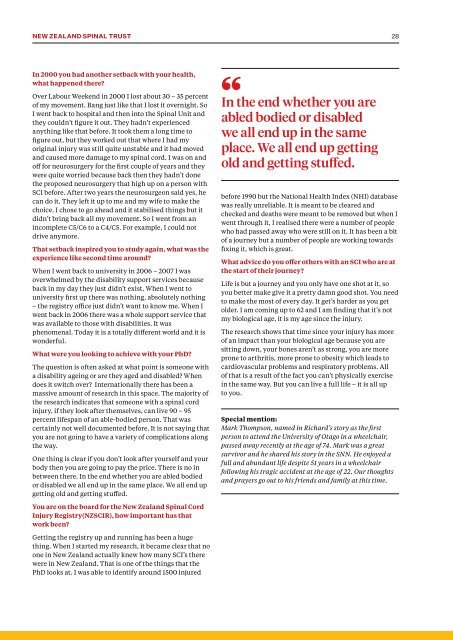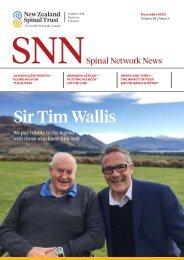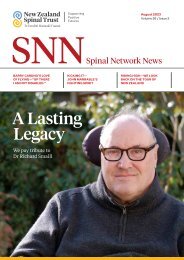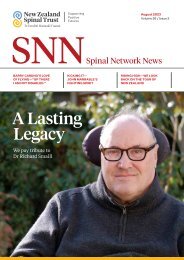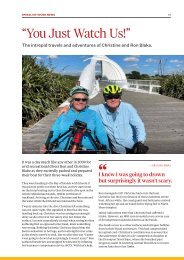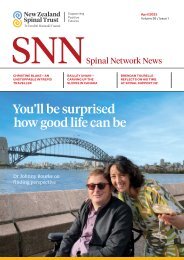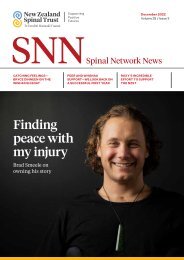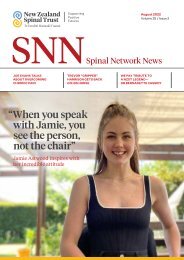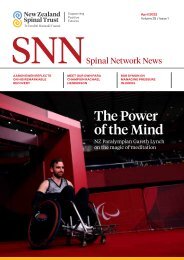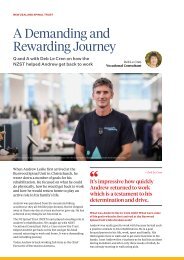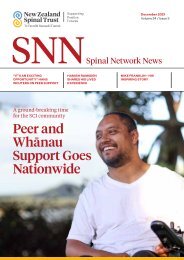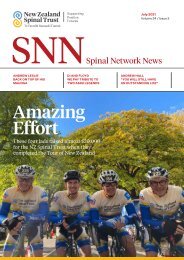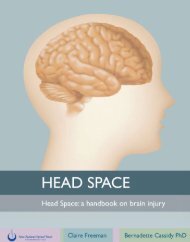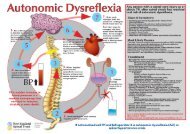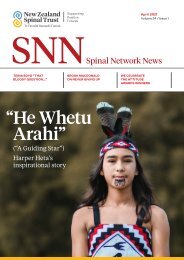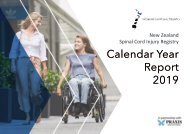SNN_August 2020 Issue FA_low res
You also want an ePaper? Increase the reach of your titles
YUMPU automatically turns print PDFs into web optimized ePapers that Google loves.
NEW ZEALAND SPINAL TRUST 28<br />
In 2000 you had another setback with your health,<br />
what happened there?<br />
Over Labour Weekend in 2000 I lost about 30 – 35 percent<br />
of my movement. Bang just like that I lost it overnight. So<br />
I went back to hospital and then into the Spinal Unit and<br />
they couldn’t figure it out. They hadn’t experienced<br />
anything like that before. It took them a long time to<br />
figure out, but they worked out that where I had my<br />
original injury was still quite unstable and it had moved<br />
and caused more damage to my spinal cord. I was on and<br />
off for neurosurgery for the first couple of years and they<br />
were quite worried because back then they hadn’t done<br />
the proposed neurosurgery that high up on a person with<br />
SCI before. After two years the neurosurgeon said yes, he<br />
can do it. They left it up to me and my wife to make the<br />
choice. I chose to go ahead and it stabilised things but it<br />
didn’t bring back all my movement. So I went from an<br />
incomplete C5/C6 to a C4/C5. For example, I could not<br />
drive anymore.<br />
That setback inspired you to study again, what was the<br />
experience like second time around?<br />
When I went back to university in 2006 – 2007 I was<br />
overwhelmed by the disability support services because<br />
back in my day they just didn’t exist. When I went to<br />
university first up there was nothing, absolutely nothing<br />
– the registry office just didn’t want to know me. When I<br />
went back in 2006 there was a whole support service that<br />
was available to those with disabilities. It was<br />
phenomenal. Today it is a totally different world and it is<br />
wonderful.<br />
What were you looking to achieve with your PhD?<br />
The question is often asked at what point is someone with<br />
a disability ageing or are they aged and disabled? When<br />
does it switch over? Internationally there has been a<br />
massive amount of <strong>res</strong>earch in this space. The majority of<br />
the <strong>res</strong>earch indicates that someone with a spinal cord<br />
injury, if they look after themselves, can live 90 – 95<br />
percent lifespan of an able-bodied person. That was<br />
certainly not well documented before. It is not saying that<br />
you are not going to have a variety of complications along<br />
the way.<br />
One thing is clear if you don’t look after yourself and your<br />
body then you are going to pay the price. There is no in<br />
between there. In the end whether you are abled bodied<br />
or disabled we all end up in the same place. We all end up<br />
getting old and getting stuffed.<br />
In the end whether you are<br />
abled bodied or disabled<br />
we all end up in the same<br />
place. We all end up getting<br />
old and getting stuffed.<br />
before 1990 but the National Health Index (NHI) database<br />
was really unreliable. It is meant to be cleared and<br />
checked and deaths were meant to be removed but when I<br />
went through it, I realised there were a number of people<br />
who had passed away who were still on it. It has been a bit<br />
of a journey but a number of people are working towards<br />
fixing it, which is great.<br />
What advice do you offer others with an SCI who are at<br />
the start of their journey?<br />
Life is but a journey and you only have one shot at it, so<br />
you better make give it a pretty damn good shot. You need<br />
to make the most of every day. It get’s harder as you get<br />
older. I am coming up to 62 and I am finding that it’s not<br />
my biological age, it is my age since the injury.<br />
The <strong>res</strong>earch shows that time since your injury has more<br />
of an impact than your biological age because you are<br />
sitting down, your bones aren’t as strong, you are more<br />
prone to arthritis, more prone to obesity which leads to<br />
cardiovascular problems and <strong>res</strong>piratory problems. All<br />
of that is a <strong>res</strong>ult of the fact you can’t physically exercise<br />
in the same way. But you can live a full life – it is all up<br />
to you.<br />
Special mention:<br />
Mark Thompson, named in Richard’s story as the first<br />
person to attend the University of Otago in a wheelchair,<br />
passed away recently at the age of 74. Mark was a great<br />
survivor and he shared his story in the <strong>SNN</strong>. He enjoyed a<br />
full and abundant life despite 51 years in a wheelchair<br />
fol<strong>low</strong>ing his tragic accident at the age of 22. Our thoughts<br />
and prayers go out to his friends and family at this time.<br />
You are on the board for the New Zealand Spinal Cord<br />
Injury Registry(NZSCIR), how important has that<br />
work been?<br />
Getting the registry up and running has been a huge<br />
thing. When I started my <strong>res</strong>earch, it became clear that no<br />
one in New Zealand actually knew how many SCI’s there<br />
were in New Zealand. That is one of the things that the<br />
PhD looks at. I was able to identify around 1500 injured


